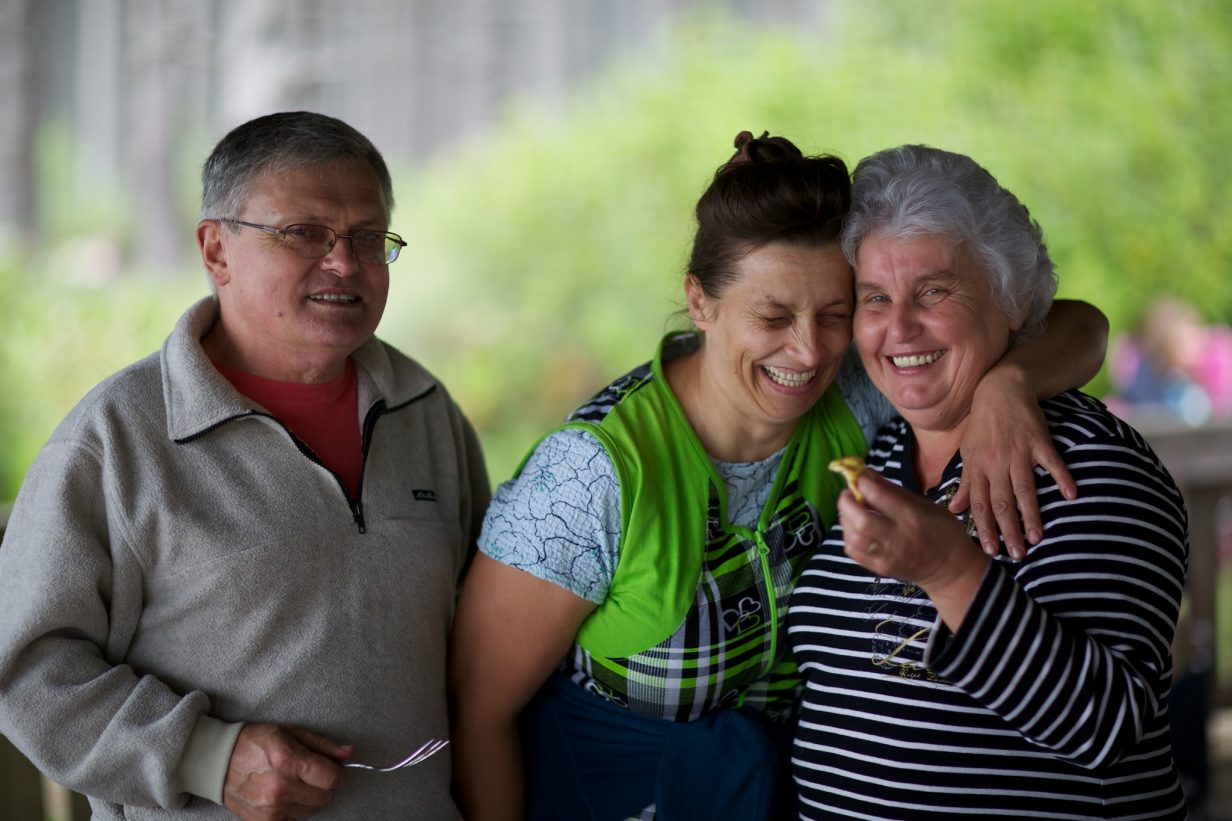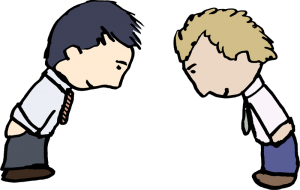
3.2 Vocative Case (Masculine Nouns)
In this module, you will learn the three vocative case endings for singular masculine nouns and the stem changes that occur in several nouns in vocative case. You will also practice matching various forms of address to different communicative situations.
Завда́ння 1
Note how masculine nouns that end in a consonant or an –о change in the vocative case.

дру́зі Миха́йло і Степа́н |
– Приві́т, Миха́йле! Як спра́ви?
– Приві́т, Степа́не. Пога́но! За́втра екза́мен… – Так, у ме́не теж. |
Complete the dialogues below paying careful attention to context.
Ціка́во!
In addition to acquiring an –e ending, a few common masculine nouns in vocative case undergo small stem changes. Remember these vocative case noun forms:
чолові́к – чолові́че!
хло́пець – хло́пче!
друг – дру́же!
Бог (‘God’) – Бо́же!
Завда́ння 2
You will hear six sentences. For each sentence, indicate who is being addressed using the nominative case (aka the dictionary form), not the vocative.
Важли́во!
While many masculine nouns that end with a consonant or an –o take the –e ending in the vocative case, there are three groups of exceptions from this rule, which take the –у ending instead.
- Nouns that end in –ко or –ик (a diminutive suffix that is used in many nicknames and to convey smallness):
Марко́ – Марку́!
ба́тько – ба́тьку!
Пе́трик – Пе́трику! (nickname from Петро́)
бра́тик – бра́тику! (‘little brother’)
- Male patronymics (always end in -ович):
(Миха́йло) Петро́вич – (Миха́йле) Петро́вичу!
(Наза́р) І́горович – (Наза́ре) І́горовичу!
- Nouns та́то, дід, син:
та́ту!
ді́ду!
си́ну!
Завда́ння 3
Mark all forms of direct addresses (nouns in the vocative case) in the dialogues below. Then answer the questions that follow.
Завда́ння 4
Note how masculine nouns that end in a soft sign or –й change in vocative case.

діду́сь Сергі́й |
– Сергі́ю, де мої́ окуля́ри? – Тут, діду́сю! |
Complete the sentences below paying careful attention to context and to what you have learned about the formation of vocative thus far.
Ціка́во!
Besides the masculine nouns ending in –й and soft sign, nouns that end with the suffix –ар also take the ending –ю in the vocative case.
For example:
лі́кар (‘doctor’) – лі́карю!
ку́хар (‘cook’) – ку́харю!
Завда́ння 5
You will hear six examples of direct address. For each, mark whether a man or a woman is being addressed. Then choose the most likely place that you would hear each example.
Важли́во!
The masculine equivalent of the feminine noun па́ні is пан. Unlike па́ні, пан changes in the vocative case, adding the regular ending –е. Like па́ні, пан can be used alone or followed by the man’s first or last name, or position/role. For example:
Па́не Васи́лю!
Па́не Поліщу́к!
Па́не дире́кторе!
Па́не профе́соре!
The nouns that follow па́не take on regular vocative case endings, with the exception of last names, which don’t change (hence Па́не Поліщу́к!)
In formal letters, emails, greeting cards, and formal public oral addresses, the masculine form of the same two adjectives as with feminine nouns is commonly used: Дороги́й (‘Dear’) or Шано́вний (‘Respected’). For example:
Дороги́й па́не Андрі́ю!
Шано́вний па́не профе́соре!
Завда́ння 6
Choose the most appropriate situation for each salutation below.
Мо́вний пазл
Look through the activities you have just completed and choose the correct statements below to summarize what you have learned.
А тепе́р тест!

| Петро́ (Пе́трик) син брат |
О́льга (О́ля) ма́ма |
Васи́ль та́то |
Катери́на (Катру́ся) дочка́ сестра́ |
Read the names, nicknames and relationship designations of each family member above. Then using the prompts, type up how these family members would address each other. In each case, give all possibilities using all the relevant nouns listed under the image. Put them in the vocative case. The first one has been done for you as a model.


